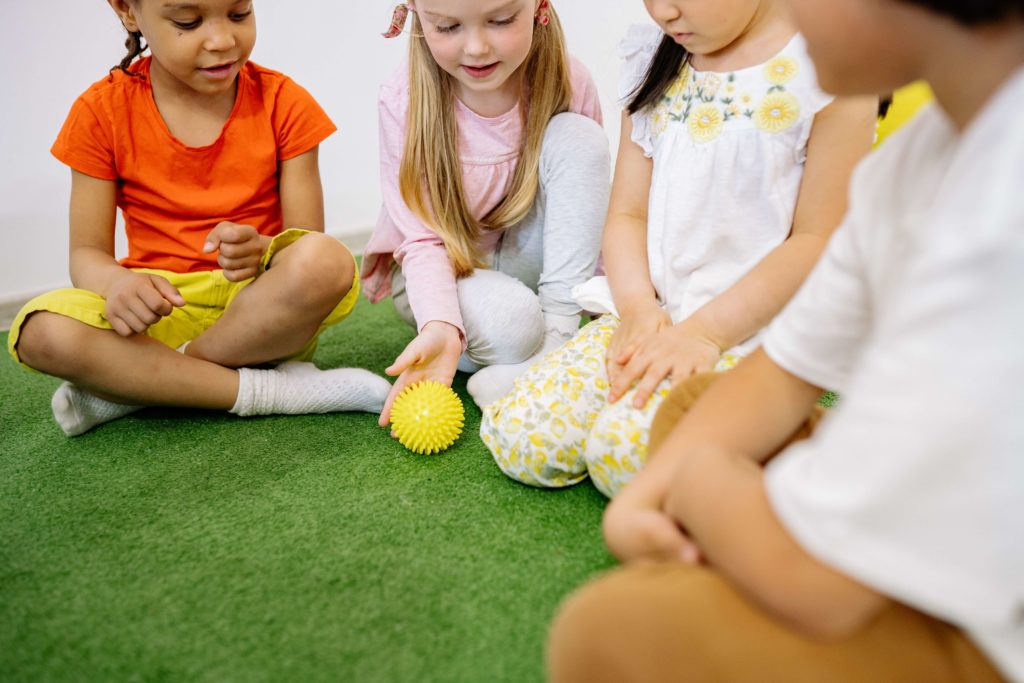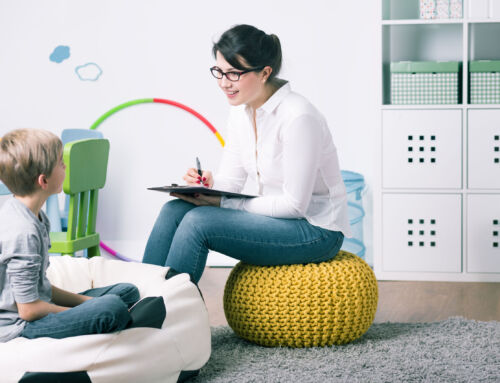Play is defined simply as an activity engaged in for enjoyment and recreation, especially by children. It is essential that children be given time to engage in play and develop their play skills. After all, play is a child’s main job! Regularly engaging in play will help children endlessly as they grow up to engage successfully in the world around them. It’s such a critical component of a child’s development.
The Importance of Play
Play is defined simply as an activity engaged in for enjoyment and recreation, especially by children. It is essential that children be given time to engage in play and develop their play skills. After all, play is a child’s main job! Regularly engaging in play will help children develop the necessary skills in the areas of communication, social skills, cognition, sensory processing, and motor skills (Johnsson, 2015). As children get older, they will be exposed to new experiences and opportunities for play. There are several ways you can support your child’s play, which are explained below. The most important thing to remember is play should be a fun and engaging experience for child and parent alike.

Children use all their senses in all types of play in order to navigate their environment and objects. This includes touch, sight, smell, and hearing. It also involves movement and balance (vestibular and proprioceptive senses). Play allows children to discover and make sense of the world around them through their senses.
Different Types of Play
As your child develops, they will engage in different levels of play at different stages. These stages of play development are:
- Solitary play – At this stage you may notice that your child prefers to play by themselves. Even if
another child is playing close by, they may not take any notice. For example, while your child plays in the sandpit they may just continually fill and empty their own bucket without taking notice of other children playing close by. - Parallel play – Is when two children play alongside one another but do not engage in play together. Your child may be playing trucks next to another child playing trucks but will not yet want to play together. Children typically begin to engage in parallel play at age 2.5.
- Associate play – Is where your child begins to interact with others in their play. This may look like two children playing dolls by themselves with one child occasionally brushing the hair of her friend’s doll. This interaction with others builds up over time. Children typically begin to engage in associative play at age 3.
- Cooperative play – Is where your child plays the same game with you or another child. For example, two children may play trains together and take turns pushing the train around the train track. Children typically begin to engage in cooperative play at age 4.
There are also different types of play which children may engage in. The types of play they may engage in can vary according to their interests, who they are playing with, equipment and resources available to them. Different types of play include:
- Pretend play: this is when children use their imagination to make up scenarios and role play. This can range from doll or teddy play to make believe adventures, such as going to outer space.
- Creative or constructive play: in this type of play, children experiment with drawing, designing, and building. As the name suggests, it involves an element of creativity. Arts and crafts, building blocks or Lego®, building houses out of cardboard, music are all examples of this type of play.
- Physical play: this type of play involves movement. In this type of play, children are generally quite active. Common examples of physical play are chasing games, nature play, obstacle courses, races, playing at the park, roughhousing, and ball games.
- Social play: this form of play is about children interacting and playing cooperatively with others. Social play helps to develop social concepts such as sharing, following rules, taking turns, and considering others.
- Games with rules: this one is self-explanatory, where children have to follow a set of structured rules. It involves board games, card games, or physical games such as “Duck Duck Goose” or “Simon Says”.

- Sensory play: sensory play is where the main element of the play is about involving the senses. While a child’s sensory systems are involved in all types of play, sensory play focuses on stimulating a child’s senses. There are lots of different types of sensory play; some examples are water play, playing in the sandbox, gardening, sound tubes, kaleidoscopes, play dough, dancing, swinging, food play.
Developing Language Skills Through Play
Play is an important way to develop both receptive language (understanding of language) and expressive language (language use) skills. All stages of play support the development of early language skills. Receptive language skills are developed in play as children listen to instructions, take direction from other children to change their play and are continually being modelled new words.
Developing Imagination Through Play
Play also enables children to expand upon their expressive language skills. Children will begin to develop longer sentences and new vocabulary as they engage in more complex play. More advanced play provides an opportunity to develop ideas and simple stories which have a beginning, a complication in the middle and an ending where the complication is resolved (Stagnitti, 2014). This allows them to develop their ideation and narrative skills (Stagnitti, 2021). This refers to the ability to come up with ideas and construct a story line. Pretend play offers children the opportunity to put ideas together to construct a plot, which is a fundamental skill to both understand and later write narratives at school.
Imagination skills are another key skill that is further developed through play. Children learn best through observing, imagining, and doing. Play provides a perfect opportunity for developing imagination skills, in particular when children are at the level to engage in pretend play. Children engage in pretend play as early as 12-15 months, however the pretend play actions happen singularly (no sequences) and very sporadically (Stagnitti, 2021), and then expand as their pretend play skills develop. Play is often how children initially learn their interests and develop different skills. Play also provides an opportunity for children to try out new ideas and express new feelings. Imagination allows children to go to a joyful space where anything can happen. And more practically, imagination fosters creativity and flexible thinking.
A good tip is to use scenarios that children are familiar with such as body actions (feeding, dressing, bathing doll, and putting doll to sleep) to engage children in imaginative play. Once children are easily engaging in these types of scenarios, expand to broader pretend scenarios which your child is familiar with, such as pretend cooking, playing house, dolls going to the park. Gradually keep expanding pretend play with more complex play scenarios.
Developing Social Skills Through Play

Social skills include the language we use to engage with others as well as our gestures, body language and ability to share interests and experiences (Johnsson, 2015). It is important for children to develop effective social skills so that they can engage, play, and learn with others. Turn taking is when one child takes a turn in a game and then waits while the other person has a go. You can help your child develop their ability to take turns by choosing back-and-forth games and gesture for your child to wait when it isn’t their turn. Your child’s choice making skills can also be developed by holding two objects at your child’s eye level and ask them what they would like to play. Encourage sharing through giving your child an opportunity to play a game which involves them waiting their turn, and giving your child lots of praise when they begin sharing themselves. Through play, children can also learn conflict resolution and negotiation skills by working out differences with their peers.
Further, play provides an opportunity for children to develop social-emotional skills. During play interactions with peers, children learn to read body language and recognise different emotional states in others. Children also learn about their own emotional states and interests through play.
Any type of play with others will provide opportunity to develop social skills, although certain types of play may promote certain social skills more than others. For example, boardgames allow plenty of opportunity to practice turn-taking while pretend play provides greater opportunities for collaboration and negotiation.
Developing Cognitive Skills Through Play
Cognitive processes include attention, reflection, perception, memory, and thought. These allow us to do things like learn, problem-solve, process information, form opinions, and make decisions. Play provides various opportunities to develop cognitive skills. Through play, children have multiple opportunities to learn new concepts, explore and experience how things work, and form mental representations about the world.
Children learn best when they are engaged; when children are having fun playing they can take in lots of new concepts. As humans, we are much more likely to retain information when it is linked to a meaningful activity (AuEssays, 2018) or intense emotion, such as pleasure or excitement (Tyng et al., 2017).
Pretend play amongst two or more people is unpredictable. As a result, children will develop flexible thinking, ideation, and problem-solving abilities as they have to think on the spot to contribute to play scenarios. Play also promotes problem-solving skills as children figure out how to work something out in the context of play; they then use their analytical thinking skills and find solutions to the problem. This can happen in any type of play. For example, finding a way to get the ball that is stuck in the tree (physical play), figuring out how to make the roof hold on the play fort (pretend play), building a big tower that will not fall (construction play).
All types of play are great to develop cognitive skills and varying the types of play will provide opportunities for children to develop a range of different cognitive skills.
Ideas for Play Activities
Some great play activities to develop language, imagination, social and cognitive skills for pre-school aged children are:

- Role play and re-enacting real life experiences e.g. shopping, doctors, going to the Zoo.
- Playing dress-ups in which children are encouraged to be different characters.
- Acting out a child’s favourite movie or TV show.
- Pretend to feed, dress and bathe dolls and other characters.
- Simple board games which encourage turn taking between children.
- Building games where children stack, sort and build with different materials.
Developing Motor Skills Through Play
During play children will use their motor skills. This may be predominantly fine or gross motor skills or a mix of both, depending on the type of play.
When playing children may need to manipulate small pieces developing their fine motor skills and eye-hand coordination. This may happen, for example, through doll play (e.g. dressing dolls), arts and crafts, building blocks.
Development of gross motor skills may happen through physical play such as sports, playing on playground equipment, obstacle courses, nature play, roughhousing (wrestling), and pretend play. In these types of play, children must navigate their environments, use balance, coordinate their movements, and manipulate small or large objects. Navigating their environment also assists in developing their spatial skills. Spatial skills refer to the ability to recognise objects in different orientations and understand the relation of space, size, and orientation between objects; for example, a child uses their spatial skills when fitting shapes in a shape sorter and also when navigating around team members while playing sports.
Tips to Develop Your Child’s Play Skills

The following strategies can be used for children who are having difficulty engaging in play and to extend the skills of children who enjoy play already.
- Give your child lots of praise and encouragement when they do engage in any form play.
- Repeatedly show your child how they could play with new toys or activities.
- Only have a small number of toys and play activities available at once as many children can become overwhelmed with too much choice.
- Follow your child’s lead and allow them to direct the play.
- Limit screen time to encourage your child to engage in play more often.
- Encourage and role model different types of play, including outside play, gross motor play and role play.
- Creating regular opportunities for your child to play with other children, such as organising play dates.
What to do if I have concerns about my child’s play skills?
If you have any persistent concerns with your child’s play skills, a qualified professional can be a great help such as a Speech Pathologist or Occupational Therapist that can assess your child’s play skills and work with you and your child to develop their play skills. A GP or Paediatrician can also be a great place to start. Our Speech Pathologists and Occupational Therapists at Beam Health can help, so please give us a call if you would like some support.

Emilie De Rop
Occupational Therapy Lead, Beam Health

Rebecca Gillogly
Speech Pathologist, Beam Health







